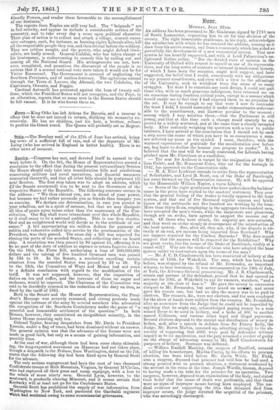ittnits.—Congress has met, and devoted itself in earnest to the
work before it. On the 8th, the House of Representatives passed a resolution to the effect that during the present extraordinary Session the House should only take into consideration bills and resolutions concerning military and naval operations, and financial measures connected therewith, and that all other bills should be postponed till next Session. The first step taken was to adopt an address, which (if the Senate concurred) was to be sent to the Governors of the respective States of the Republic. The following sentence occurs in the address : "We thus entreat you, not in dread of your power, but because we had rather persuade you as friends than conquer you as enemies. We declare our determination, in case you persist in your rebellion, not in a spirit of menace, but that we may dissipate all idea of peace upon terms other than the supremacy of the Con- stitution. Our flag shall wave triumphant over this whole Republic, .or it shall cease to be a natimial emblem. This is our firm resolve. God and an enlightened world will decide as to the rectitude of our cause." A bill appropriating six million dollars for payment of militia and volunteers called into service by the proclamation of the President, was then passed. The same day a bill was reported for closing the ports of the seceded States, and collecting dues on board ship. A resolution was then passed by 92 against 55, affirming it to be no part of the duty of soldiers to capture or return fugitive slaves. On the 10th, the Force Bill, authorizing a loan of 500,000,000 dollars and the raising of five hundred thousand men was passed by 135 to 10. In the Senate, a resolution expelling certain senators from the seceded States was passed by 32 to 10. Up to the 12th, the Committee of Ways and Means had not come to a definite conclusion with regard to the modification of the tariff. It was not supposed, however, that the imposition of duties on tea and coffee, and the increase of those on sugar and molasses, would be opposed. The Chairman of the Committee was said to be decidedly opposed to the redaction of the duty on iron, as fixed by the tariff of 1861. Both in the Senate and the House of Representatives, the Presi- dent's Message was severely censured, and strong protests made against the increase of the army by several members who advocated the recognition of the Southern Confederacy under the guise of "a peaceful and honourable settlement of the question." In both Houses, however, they constituted an insignificant minority, in the Lower House counting only ten. .Colonel Taylor, bearing despatches from Mr. Davis to President Lincoln, under a flag of truce, had been dismissed without an answer. The general opinion was that the advances of the former were not made in good faith, but only as a means of gaining information, and possibly time. At the seat of war, although there had been some sharp skirmish- ing, the long-expected movement on Manassas had not taken place, though a despatch in the Tribune, from Washington, dated on the 7th, states that the following day had been fixed upon by General Scott for the advance.
The only serious engagement had been the rout of two thousand Confederate troops at Rich Mountain, Virginia, by General M'Clellan, who had captured all their guns and camp equipage, with a loss to the rebels of some ninety men. General Lyon, however, to the westward, is gradually clearing Missouri, and it seems certain that Kentucky will at least not go for the Confederate States.
General Scott has prohibited the supply of war information from -Washington to New York, and pardoned the Garibaldi regiment Vlach had mutinied owing to some commissariat grievances.






























 Previous page
Previous page